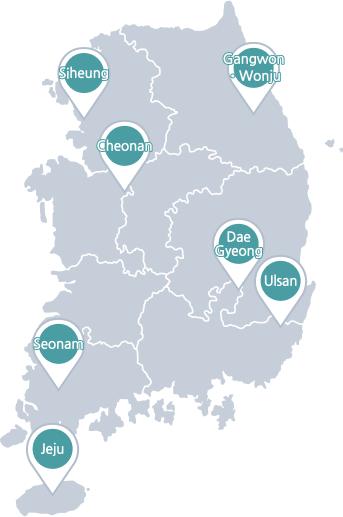Incheon and Gyeonggi aim to become the world’s top bio mega cluster, while Daejeon focuses on innovative new drug R&D. Following semiconductors, batteries, and displays, biotechnology has also been designated as a specialized high-tech strategic industry. Five regions, including Incheon-Gyeonggi (Siheung), Daejeon (Yuseong), Gangwon (Chuncheon-Hongcheon), Jeonnam (Hwasun), and Gyeongbuk (Andong-Pohang), have been newly designated as specialized complexes for the national advanced strategic industry in the bio sector. These areas are expected to attract private investments of over 36 trillion KRW by 2040.
![[Press] Incheon-Siheung city is designated as one of Bio-Industry Destricts, with 36.3 Trillion KRW Private Investment by 2040 2 바이오 분야 국가첨단전략산업 특화단지 지정 현황](https://img4.yna.co.kr/etc/inner/KR/2024/06/27/AKR20240627116100003_01_i_P2.jpg)
On the 27th, the government held the 6th National Advanced Strategic Industry Committee meeting, chaired by Prime Minister Han Duck-soo, and approved the agenda for designating specialized complexes for the bio sector. The government evaluated applications from 11 regions based on the scale of investments by leading companies, potential for industrial ecosystem development, and regional balance development. The selected regions are expected to become global hubs, with Incheon-Gyeonggi (Siheung), home to Samsung Biologics, envisioned as the world’s top bio mega cluster. The bio-pharmaceutical manufacturing capacity, currently the largest in a single city at 1.165 million liters, will nearly double to 2.145 million liters by 2032.
Based on an excellent R&D foundation and leading companies with clusters of national and private research facilities, the goal is to achieve technological innovation and create a new drug pipeline, including developing two blockbuster drugs by 2032. Gangwon (Chuncheon-Hongcheon) aims to establish itself as a hub for ‘AI-based new drug development and small-to-medium contract development and manufacturing (CDMO).’ By linking and expanding bio infrastructure like the AI Healthcare Global Innovation Zone, antibody industry, and digital healthcare with surrounding areas, they plan to advance the bio industry.
Jeonnam (Hwasun) aims to build a stable vaccine production and immune therapy industry ecosystem by creating an ‘R&D-(non)clinical-vaccine manufacturing ecosystem’ based on existing infrastructures like the Hwasun Vaccine Industry Zone.
Gyeongbuk (Andong-Pohang) plans to secure ‘bio-vaccine global competitiveness’ based on infrastructures like the Andong Bio-Life National Advanced Industrial Complex and the technological capabilities of institutions like POSTECH (Pohang University of Science and Technology).
The government anticipates leading companies to invest 36.3 trillion KRW in these five National Advanced Strategic Industry bioindustry districts by 2040.
The designation of these districts under the National Advanced Strategic Industry Special Act does not involve creating new physical complexes but rather bundling planned or existing industrial areas as clusters to provide various support measures. Previously, the government designated seven areas as National Advanced Strategic Industry complexes in July last year, including Yongin-Pyeongtaek and Gumi (semiconductors), Cheongju, Pohang, Saemangeum, and Ulsan (secondary batteries), and Cheonan-Asan (displays). This time, they have added bioindustry districts.
In these designated districts, preliminary feasibility studies can be waived, and a timeout system for permits will be introduced, meaning permits are considered granted 60 days after a fast-track decision by the Advanced Industry Committee. Additionally, for companies with advanced strategic technologies like semiconductors, the floor area ratio can be increased by up to 1.4 times within the specialized districts.
The government stated, “Although our country has secured the world’s second-largest biopharmaceutical manufacturing capacity based on large-scale private investment, overall competitiveness in technology development and the manufacturing ecosystem is still lacking. By designating specialized districts in the bio sector, we aim to secure a super-gap in bio technology and industry, considering it as the ‘second semiconductor’ and a future economic growth driver.”
cha@yna.co.kr
출처: [YNA] https://m.yna.co.kr/view/AKR20240627116100003


![[Press] Incheon-Siheung city is designated as one of Bio-Industry Destricts, with 36.3 Trillion KRW Private Investment by 2040 1 바이오 분야 국가첨단전략산업 특화단지 지정 현황](https://kamic.or.kr/wp-content/uploads/2024/07/1719471112231.jpg)
